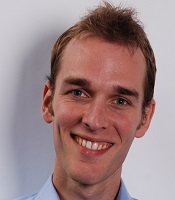June 2018 - A theory of education, health and longevity
On Thursday, June 14, dr. Hans van Kippersluis (Erasmus University Rotterdam) visited us at the Faculty of Economics and Business to talk about his latest research on education, health and longevity. This seminar was organised by Centre of Expertise Healthwise, the signature area Public Health and the Aletta Jacobs School of Public Health.

About dr. Hans van Kippersluis
Hans van Kippersluis is Associate Professor of Health Economics at the Erasmus School of Economics, Erasmus University Rotterdam. He is also a Research Fellow at the University of Southern California, USA, a Research Fellow at the Tinbergen Institute, The Netherlands, and a Research Fellow at Netspar, Tilburg, The Netherlands.
His research interest lies mainly in human capital formation and health behavior:
- How do different components of human capital (e.g., education, health) relate to each other and interact with each other: why are higher educated individuals healthier than lower educated?
- Why do rich people smoke less? What are the genetic and environmental determinants of education, health, and health behavior? How can we induce people to look after their health?
Read more:
> Go to the website of Hans van Kippersluis
Abstract
A Theory of Education, Health and Longevity
This paper presents a unified theory of human capital with both health capital and, what we term, skill capital endogenously determined within the model. By considering joint investment in health capital and in skill capital, the model highlights similarities and differences in these two important components of human capital. Health is distinct from skill: health is important to longevity, provides direct utility, provides time that can be devoted to work or other uses, is valued later in life, and eventually declines, no matter how much one invests in it (a dismal fact of life). The theory provides a conceptual framework for empirical and theoretical studies aimed at understanding the complex relationship between education, health and longevity, and generates new testable predictions on (i) the effect of health on skill formation, and (ii) the powerful effect of longevity gains on health and economic inequality.
| Last modified: | 19 May 2022 2.52 p.m. |

